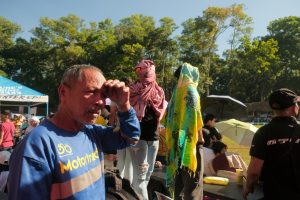Singapore Elevates Mental Health as National Focus
In a significant move to prioritise mental health, Deputy Prime Minister Lawrence Wong, along with Senior Parliamentary Secretary Rahayu Mahzam, has emphasised the importance of mental health as a national concern in Singapore.
In his address to the Parliament, Deputy Prime Minister Lawrence Wong highlighted the complexity of mental health issues within the community. Emphasising the diverse nature of these challenges, he indicated that mental health concerns span a wide spectrum, necessitating a varied and comprehensive set of solutions. This perspective lays the groundwork for Singapore’s strategic approach. It aims to cater to the broad range of mental health needs across the nation.
Youth Mental Health Insights
Building upon DPM Wong’s framework, Mdm Mahzam delved into the specifics of youth mental health. Data from the Singapore Youth Epidemiology and Resilience study was referenced. This study was conducted by the National University of Singapore in collaboration with the Ministry of Education. It revealed a notable discrepancy: while a significant 37% of respondents reported symptoms such as depression and anxiety, only 12% met the full criteria for a diagnosed mental disorder.
Mdm Mahzam highlighted this gap to illustrate the dynamic nature of mental health among youths. Many symptoms might be transient and not necessarily indicative of long-term mental disorders. This insight is crucial for tailoring appropriate mental health interventions. Particularly, in differentiating between those needing immediate, intensive care and those who might benefit more from community-based support.
Tiered Care Model in Mental Health
Central to Singapore’s mental health strategy is the implementation of the Tiered Care Model. Mdm Mahzam described this as the cornerstone of the National Mental Health and Well-Being Strategy. It outlines a structured approach to mental health services, offering different levels of care based on the intensity of the intervention required.
This model is pivotal in ensuring that individuals receive appropriate care at the right time, tailored to their specific needs. Moreover, the right-siting of care, particularly shifting the focus from hospitals to community settings, is a key aspect of this model. Furthermore, it aligns with global mental health care trends, where countries like Australia, Canada, and the United Kingdom have found success with similar community-based mental health systems.
Enhancing Community Mindsets and Resources
Emphasising the significance of community involvement in mental health care, Mdm Mahzam addressed the necessity of cultivating the right mindsets and allocating sufficient resources. She articulated the importance of empowering communities to play an active role in mental health care. This involves not only providing the necessary services and support, but also ensuring these are organised in a way that makes them accessible when needed. The approach is multifaceted, encompassing mental health promotion, increasing the affordability of services, and addressing the manpower needs within the mental health sector.
Mental Health Literacy and Public Engagement
Strengthening mental health literacy and public engagement forms a critical component of Singapore’s strategy. Improving public attitudes towards mental health is crucial for societal change. Efforts like the Health Promotion Board’s ‘It’s OKAY to Reach Out’ campaign and the National Council of Social Service’s Beyond the Label movement are pivotal in this regard.
These initiatives aim to normalise conversations about mental health and encourage individuals to seek help when needed. The success of these campaigns is evident in their impact. This is seen in post-campaign surveys showing increased motivation among youths to seek emotional support. Additionally, online platforms like HPB’s MindSG have become valuable resources for mental health information.
Targeted Initiatives for Diverse Groups
Singapore’s mental health strategy also includes targeted initiatives for specific demographic groups. This acknowledges that different segments of the population have unique mental health needs. For youth, the government has implemented dedicated community mental health teams like CREST-Youth and Youth Integrated Teams (YITs). This focuses on early identification and intervention.
These teams play a crucial role in providing mental health assessments and psychosocial interventions. They cater specifically to the nuanced needs of young individuals. Additionally, programmes like the Response, Early Intervention and Assessment in Community Mental Health (REACH) and CHAT services offer vital support for students and youths at risk. The strategy extends beyond youths, encompassing seniors, caregivers, women, and minorities, each benefiting from tailored outreach and support programmes. This diverse approach ensures that mental health care is inclusive and responsive to the varied needs within the community.
Commitment to Accessible and Affordable Mental Health Care
The speeches by Deputy Prime Minister Lawrence Wong and Senior Parliamentary Secretary Rahayu Mahzam highlight Singapore’s firm commitment to advancing mental health care. The proactive steps taken by the government, in collaboration with various sectors, demonstrate a forward-thinking approach to addressing the multifaceted nature of mental health in a modern society.
Image credit via REUTERS/Isabel Kua/ File Photo
References
- SPEECH BY MDM RAHAYU MAHZAM, SENIOR PARLIAMENTARY SECRETARY, MINISTRY OF HEALTH & MINISTRY OF LAW, AT THE MOTION DEBATE ON ADVANCING MENTAL HEALTH ON 7 FEBRUARY 2024. (n.d.). MOH | News Highlights. Retrieved February 7, 2024, from https://www.moh.gov.sg/news-highlights/details/speech-by-mdm-rahayu-mahzam-senior-parliamentary-secretary-ministry-of-health-ministry-of-law-at-the-motion-debate-on-advancing-mental-health-on-7-february-2024














